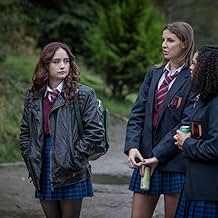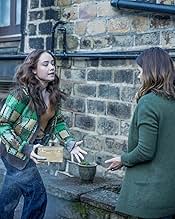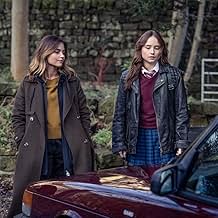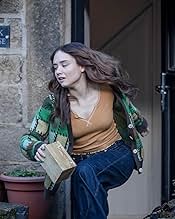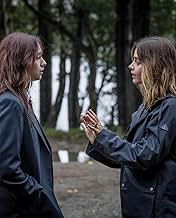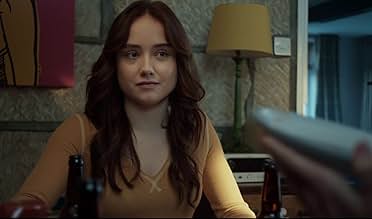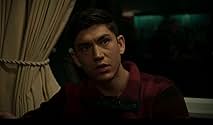L'enquêtrice Ember Manning doit découvrir comment l'incendie d'une maison de vacances est lié à une journaliste qui enquête sur une affaire de disparition et à un triangle amoureux illicite.L'enquêtrice Ember Manning doit découvrir comment l'incendie d'une maison de vacances est lié à une journaliste qui enquête sur une affaire de disparition et à un triangle amoureux illicite.L'enquêtrice Ember Manning doit découvrir comment l'incendie d'une maison de vacances est lié à une journaliste qui enquête sur une affaire de disparition et à un triangle amoureux illicite.
Parcourir les épisodes
Avis à la une
I had read some of the reviews on here and didn't expect much, but my wife and I thought we would give it a try.
However, despite some reviews saying it was hard to follow etc, we didn't feel like it was and it kept us both watching for the duration of the series.
Jenna Coleman played a fantastic part, even though she had stepped in a new direction with playing the role as a detective. But also, because she is nearing 40 and she still radiates beauty from her teens and doesn't seem to age, and because of this, we struggled to see her as a mature woman detective.
But, any doubts on whether she could pull it off, was pushed aside by some great acting by not only Jenna, but the rest of the cast too.
So, all in all this was a very watchable program and we were invested in the series and watched it to its conclusion.
Well acted on a subject that was tactfully done.
However, despite some reviews saying it was hard to follow etc, we didn't feel like it was and it kept us both watching for the duration of the series.
Jenna Coleman played a fantastic part, even though she had stepped in a new direction with playing the role as a detective. But also, because she is nearing 40 and she still radiates beauty from her teens and doesn't seem to age, and because of this, we struggled to see her as a mature woman detective.
But, any doubts on whether she could pull it off, was pushed aside by some great acting by not only Jenna, but the rest of the cast too.
So, all in all this was a very watchable program and we were invested in the series and watched it to its conclusion.
Well acted on a subject that was tactfully done.
A fundamental issue in stories with noble intentions is often the writer can't get out of the way of the moral, zeitgeist messaging long enough to tell a gripping, viable story. The by-product of that can lead to ridiculous, convoluted or forced plot points to desperately generate some level of excitement. This suffers from both. But that's not the only problem with The Jetty. At least fifty percent of the scenes here feel inauthentic.
There are so few realistic human interactions throughout with most feeling like the writer was desperate to crowbar in witty and pithy one-liners at the expense of anything credible. The dialogue is clunky at best. Just as an example, at one stage Caitlin's mother delivers the line 'I told Caitlin you lock them in your bottom drawer'. Ember replies 'who?'. What kind of response is that!? 'Them' would clearly suggest an object. Or does Ember actually believe Caitlin locks people in drawers?! This might seem minor, but these clunks in dialogue are peppered throughout with characters jarringly delivering wax-lyrical lines in tense emotional moments in a way no actual human ever would.
That's one of the many issues with the main character. There's such a desperation to establish her as the edgy, hard-nosed cop and laid-back mother that the writer often forces those character traits into the scenes. Whether abusing the man who just had his building burnt down or swearing at a records clerk just doing his job or cracking open a beer for her teenage daughter, it just all feels plastic and forced.
These kind of actions and reactions by the protagonist as well as everyone involved rarely feel like genuine character moments, serving mainly to further the plot, but at the expense of logic. Town inhabitants who have seemingly known each other years, interact like they just moved there, purely to deliver exposition. As an example, the ending to episode 3, both in logistics and believability is derisible, not helped by the heavy-handed use of podcast sermon as a device to sledge-hammer home the message.
And message-wise there is undoubtedly a noble intent to shine a light on the dangers of toxic masculinity and how it can thrive in isolated smaller town settings, but everyone involved in this endeavour lacks the skills to translate that to the screen in a way that doesn't come across heavy-handed, agenda-fuelled or, worse still, preachy.
That said, it's not a complete misfire. There is a solid use of non-linear narrative and flashback device to effectively convey backstory, but the key issue is there's just nothing new to say here. Those few original moments come across more like random attempts at shock value (ever wished for a scene where an underage teenager gives hand relief to a horse. You're in luck!) and the less said about the ludicrous final reveal the better.
The overall problem is everything just feels trite and tired which is especially impressive and seemingly hard to achieve given the messaging itself is so timely.
There are so few realistic human interactions throughout with most feeling like the writer was desperate to crowbar in witty and pithy one-liners at the expense of anything credible. The dialogue is clunky at best. Just as an example, at one stage Caitlin's mother delivers the line 'I told Caitlin you lock them in your bottom drawer'. Ember replies 'who?'. What kind of response is that!? 'Them' would clearly suggest an object. Or does Ember actually believe Caitlin locks people in drawers?! This might seem minor, but these clunks in dialogue are peppered throughout with characters jarringly delivering wax-lyrical lines in tense emotional moments in a way no actual human ever would.
That's one of the many issues with the main character. There's such a desperation to establish her as the edgy, hard-nosed cop and laid-back mother that the writer often forces those character traits into the scenes. Whether abusing the man who just had his building burnt down or swearing at a records clerk just doing his job or cracking open a beer for her teenage daughter, it just all feels plastic and forced.
These kind of actions and reactions by the protagonist as well as everyone involved rarely feel like genuine character moments, serving mainly to further the plot, but at the expense of logic. Town inhabitants who have seemingly known each other years, interact like they just moved there, purely to deliver exposition. As an example, the ending to episode 3, both in logistics and believability is derisible, not helped by the heavy-handed use of podcast sermon as a device to sledge-hammer home the message.
And message-wise there is undoubtedly a noble intent to shine a light on the dangers of toxic masculinity and how it can thrive in isolated smaller town settings, but everyone involved in this endeavour lacks the skills to translate that to the screen in a way that doesn't come across heavy-handed, agenda-fuelled or, worse still, preachy.
That said, it's not a complete misfire. There is a solid use of non-linear narrative and flashback device to effectively convey backstory, but the key issue is there's just nothing new to say here. Those few original moments come across more like random attempts at shock value (ever wished for a scene where an underage teenager gives hand relief to a horse. You're in luck!) and the less said about the ludicrous final reveal the better.
The overall problem is everything just feels trite and tired which is especially impressive and seemingly hard to achieve given the messaging itself is so timely.
DC Ember Manning investigates a fire at a jetty, an event that causes her to look into a cold case, the disappearance of a girl called Amy. Ember has to face the prospect of her late husband Malachy being involved.
Ember, the central character was billed as the new Vera, that's the reason I tuned in, but let's be honest here, it's not in the same league, she's a Northern Detective, and that's it.
I found this generally disappointing, episode three is pretty good, but the rest is average at best, not as bad as some of the scathing reviews, and those giving this eight and nine star ratings, I'll have a pint of what you're drinking.
I may be slow on the uptake, but it took me ages to work out that two different times were running at that same time. The narrative is absolutely all over the place, it's hard to follow and keep up with, largely because it's so dull in parts.
Visually it's too dark, it's like Jamaica Inn all over again, some nice visuals, especially at the start of the first episode.
The Male characters are all atrocious, as you'd expect from The BBC, Hitch is a man child, Malachy is a drug dealing creep, Russell is a psycho, Needham is a bully, let's face it, not one of them is even half decent.
Coleman is a very talented actress, but she's totally wrong for this part, I didn't think she had any degree of presence, she at no point feels like a Detective.
I'm not sure I see this being recommissioned.
5/10.
Ember, the central character was billed as the new Vera, that's the reason I tuned in, but let's be honest here, it's not in the same league, she's a Northern Detective, and that's it.
I found this generally disappointing, episode three is pretty good, but the rest is average at best, not as bad as some of the scathing reviews, and those giving this eight and nine star ratings, I'll have a pint of what you're drinking.
I may be slow on the uptake, but it took me ages to work out that two different times were running at that same time. The narrative is absolutely all over the place, it's hard to follow and keep up with, largely because it's so dull in parts.
Visually it's too dark, it's like Jamaica Inn all over again, some nice visuals, especially at the start of the first episode.
The Male characters are all atrocious, as you'd expect from The BBC, Hitch is a man child, Malachy is a drug dealing creep, Russell is a psycho, Needham is a bully, let's face it, not one of them is even half decent.
Coleman is a very talented actress, but she's totally wrong for this part, I didn't think she had any degree of presence, she at no point feels like a Detective.
I'm not sure I see this being recommissioned.
5/10.
I don't know why I keep trying again with BBC drama. Whoever commissions all this stuff is going to go down in history alongside an infamous litany of heroic would-be worthiness and artistic worthlessness, albeit that I can't myself discern what is intended to be worthy about it. Certainly not its dramatic value.
This one is just grim, and the guilty include the sound technicians as well as the usual suspects of producers, writers, editors and the rest.
I don't know about the non-linear timeline thing in this one. OK I was fooled by it. Maybe I should take the optimistic view that it was a fresh use of the device that was cleverer than I was expecting, and I should rejoice in the effect. But I'm not left feeling optimistic.
I'm definitely not well-disposed towards yet another bloody cop-centred thing - where the lead cop is flawed, conflicted, emotionally involved, gets suspended halfway through, throws their weight about brainlessly etc, even though we contrive today's version of the plot twist - unless by chance some truly excellent drama results. Not this time I fear.
One little problem was that the focus character just wasn't a convincing policeperson. I doubt if this is Ms Coleman's fault, but perhaps someone else could have used the same material more convincingly: the things she does just aren't cop-like at all. One might take the view that this is because she's a fresh take, away from the old cliches: OK I'm open to that in principle, but this just didn't work for me.
One bit I did like was the big put-down when she tells the the Southern incomer victim of arson that she won't investigate his crime because it's a hopeless case, and she can't be bothered anyway because he's an entitled twirp. Now that's a real glimpse at the sort of policing I'm familiar with.
I'm certain there is mileage in a well-conceived and well-executed plot that exposes the bad young rebel girl versus exploited vulnerable child dimensions, and occasionally this one had a go and approached the mark, but never quite hit it. Why do girls behave like that? Asks one character, and is answered by the one who might know, sadly mumbling the lines, probably because they were so clunky even if true. There is insight to be imparted on this, to be sure, but scarce did we glimpse it, I fear. And the girl spotlighted in this work is not the unloved abandoned child of chaotic upbringing spattered with adverse childhood events, but the sort of poor little rich girl who tends to get featured so repeatedly in BBC scripts: who knows why!
OK let me be fairer. There are a few different women's stories here, from working-class to toff, schoolgirl to geriatric, single mum to housewife to academic, and even one ethnic. None of them seems to have much fun.
As for the abusers. I don't know. They were more a collective pastiche than individual characters. Maybe that's the right approach for a victim-centred view. The supposed serial child abuser at the centre of everything has somehow disappeared. Who and where is he? Do we already know him? The answer is perhaps intended to be the most interesting aspect of the whole story, but how the whole case could have gone cold is anyone's guess. And, clunk of clunks, when we finally find the witness who could perhaps cast light on the case she just happens to be delivering a lecture about Artemisia Gentileschi's "Judith Beheading Holofernes." I do think, dear production team that, if you want to weave in these kind of referential touches, you do need to be a master craftsman. Else, just keep it to the contemporary industrial TV that it is.
And that just about sums the thing up. It's not so much a fine blend of herbes de Provence as a pot pourri of half-formed styles, threads, and techniques that doesn't result in a great tasting compote. Loved the setting: great country, lovely vernacular stonework inside and out, fine with the principles: bad stuff and humdrum lurking beneath the idyll, female-centred lens - hence the comparisons with Happy Valley - but overall it's still a messy miss I fear, the plot twists and sub-plots might even be original but are not that absorbing, and the drama ultimately just isn't very dramatic, leading to a weak and unconvincing denouement. At least the top and tail flames seemed real, so some credit to the BBC's budget.
This one is just grim, and the guilty include the sound technicians as well as the usual suspects of producers, writers, editors and the rest.
I don't know about the non-linear timeline thing in this one. OK I was fooled by it. Maybe I should take the optimistic view that it was a fresh use of the device that was cleverer than I was expecting, and I should rejoice in the effect. But I'm not left feeling optimistic.
I'm definitely not well-disposed towards yet another bloody cop-centred thing - where the lead cop is flawed, conflicted, emotionally involved, gets suspended halfway through, throws their weight about brainlessly etc, even though we contrive today's version of the plot twist - unless by chance some truly excellent drama results. Not this time I fear.
One little problem was that the focus character just wasn't a convincing policeperson. I doubt if this is Ms Coleman's fault, but perhaps someone else could have used the same material more convincingly: the things she does just aren't cop-like at all. One might take the view that this is because she's a fresh take, away from the old cliches: OK I'm open to that in principle, but this just didn't work for me.
One bit I did like was the big put-down when she tells the the Southern incomer victim of arson that she won't investigate his crime because it's a hopeless case, and she can't be bothered anyway because he's an entitled twirp. Now that's a real glimpse at the sort of policing I'm familiar with.
I'm certain there is mileage in a well-conceived and well-executed plot that exposes the bad young rebel girl versus exploited vulnerable child dimensions, and occasionally this one had a go and approached the mark, but never quite hit it. Why do girls behave like that? Asks one character, and is answered by the one who might know, sadly mumbling the lines, probably because they were so clunky even if true. There is insight to be imparted on this, to be sure, but scarce did we glimpse it, I fear. And the girl spotlighted in this work is not the unloved abandoned child of chaotic upbringing spattered with adverse childhood events, but the sort of poor little rich girl who tends to get featured so repeatedly in BBC scripts: who knows why!
OK let me be fairer. There are a few different women's stories here, from working-class to toff, schoolgirl to geriatric, single mum to housewife to academic, and even one ethnic. None of them seems to have much fun.
As for the abusers. I don't know. They were more a collective pastiche than individual characters. Maybe that's the right approach for a victim-centred view. The supposed serial child abuser at the centre of everything has somehow disappeared. Who and where is he? Do we already know him? The answer is perhaps intended to be the most interesting aspect of the whole story, but how the whole case could have gone cold is anyone's guess. And, clunk of clunks, when we finally find the witness who could perhaps cast light on the case she just happens to be delivering a lecture about Artemisia Gentileschi's "Judith Beheading Holofernes." I do think, dear production team that, if you want to weave in these kind of referential touches, you do need to be a master craftsman. Else, just keep it to the contemporary industrial TV that it is.
And that just about sums the thing up. It's not so much a fine blend of herbes de Provence as a pot pourri of half-formed styles, threads, and techniques that doesn't result in a great tasting compote. Loved the setting: great country, lovely vernacular stonework inside and out, fine with the principles: bad stuff and humdrum lurking beneath the idyll, female-centred lens - hence the comparisons with Happy Valley - but overall it's still a messy miss I fear, the plot twists and sub-plots might even be original but are not that absorbing, and the drama ultimately just isn't very dramatic, leading to a weak and unconvincing denouement. At least the top and tail flames seemed real, so some credit to the BBC's budget.
This series started well. Jenna Coleman is a terrific actress. Some of the sub plots were too dark, also slightly confusing. I felt there was no need for some of the scenes as they did not add to the story. There was suspense and good acting and the makings of a good story. There were simply too many side issues going on. I realise they build around the main story however they also distracted from it. When it got to the last episode, it was drawn out way too long. It got to the stage that I was wishing it would get to the chase and just end. I found that, when it finished, I was wondering what the heck did I just watch?
Meilleurs choix
Connectez-vous pour évaluer et suivre la liste de favoris afin de recevoir des recommandations personnalisées
Détails
- Date de sortie
- Pays d’origine
- Langue
- Aussi connu sous le nom de
- Ember Manning: Fallet vid bryggan
- Lieux de tournage
- Lancashire, Angleterre, Royaume-Uni(Hollingworth Lake, Littleborough)
- Sociétés de production
- Voir plus de crédits d'entreprise sur IMDbPro
- Durée1 heure
- Couleur
- Mixage
- Rapport de forme
- 16:9 widescreen
Contribuer à cette page
Suggérer une modification ou ajouter du contenu manquant




